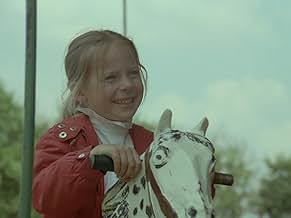Dekalog, siedem
- Episode aired Jun 15, 1990
- TV-MA
- 57m
IMDb RATING
7.8/10
4.1K
YOUR RATING
Raised as sisters, one is in fact the other's mother. Unwilling to continue living a lie, the mother tries to get her daughter back from her parents.Raised as sisters, one is in fact the other's mother. Unwilling to continue living a lie, the mother tries to get her daughter back from her parents.Raised as sisters, one is in fact the other's mother. Unwilling to continue living a lie, the mother tries to get her daughter back from her parents.
- Director
- Writers
- Stars
- Director
- Writers
- All cast & crew
- Production, box office & more at IMDbPro
Featured reviews
Episode 7 of 'Dekalog' is substantially less intense than most of those that preceded it, and seems rather less complex, as well. Young Majka (Maja Barelkowska) has surrendered her daughter Ania, the product of a teenager pregnancy, to the care of her mother, Ewa (Anna Polony). Here, Kieslowski condemns the sins of both parties: Ewa for taking possession of Ania as a substitute daughter (following her own inability to conceive a second child), and Majka for "stealing" back the child, despite being an inexperienced and arguably unfit mother. There's a bit of Tarkovskian flair in the cinematography by Dariusz Kuc. In one scene, Majka and Ania pause at the riverside beneath a bridge, and watch the current swirl debris downstream. It's such a lonely moment, incredibly peaceful and yet hauntingly so.
The template for Dekalog is that we enter a life with its anxieties (a dying husband on a hospital bed, a husband who disappeared on Christmas Eve) and at some point the narrative surface gives way and reveals a more fluid, more interdepentent life of suffering beneath.
This is evident here in a child sister abducted (after a theatric performance no less, after the swirl of fiction) and by next morning she has become a daughter. We explore a bit more but it never amounts to more than drama about the choices we have to make.
The Kieslowski I like, as I am discovering with these Dekalog viewings, is that way he has of visually slipping ahead and back. This is on the more typical end of the spectrum, all about moral anxiety and doublebinds. The ending is both emotional and convenient, poured on as syrup instead of laid out as vision.
This is evident here in a child sister abducted (after a theatric performance no less, after the swirl of fiction) and by next morning she has become a daughter. We explore a bit more but it never amounts to more than drama about the choices we have to make.
The Kieslowski I like, as I am discovering with these Dekalog viewings, is that way he has of visually slipping ahead and back. This is on the more typical end of the spectrum, all about moral anxiety and doublebinds. The ending is both emotional and convenient, poured on as syrup instead of laid out as vision.
Custody battle between 22 year-old mother and her own mother over daughter born to the former when she was just 16. Thus, touches on overweening parental possessiveness alluded to in IV, VI and VIII. Very modest in scope, using few actors, a minimum of sets. Like VI, it suffers from lack of credibility: the young mother, a reasonably intelligent woman, undertakes a rather scatterbrained kidnap. Too much of the conflict takes place in the past, not in the movie itself. And, yes, there's color coding. Despite its shortcomings, the anguish is real, and deep enough to force one to recall one's own relationship with one's parents: Another Freudian foray.
Dekalog Seven isn't the strongest of the ten, but, like Dekalog Five, Kieslowski takes a fairly straightforward commandment and adds a twist to it. Sure, we may think Majka steal Ania, but, as Majka says, can you really steal something that was yours to begin with? It's an interesting question, and Kieslowski forces you to consider (And ultimately decide) who, Ewa or Majka, is really at fault for stealing Ania. But that's typical Kieslowski. To have a straightforward plot with a cut-and-dry scenario would be far too easy for him, and I've come to expect nothing less from his work. The types of questions he subtly asks the viewer are more important than any moral he could tell us because it forces us to question our own values and morals, instead of being told, and this kind of questioning is why Kieslowski and his works are so highly regarded.
The film can be evaluated at several levels. It offers several layers of meaning, teasing the viewer as it progresses.
Kidnapping your own daughter from the ownership of your mother is a bizarre situation. Two women want to own a young child--the biological mother and the grandmother who yearned to "suckle" another. Interestingly the script looks at three generations of the same sex. The males seem to be the outsiders, yet balanced in comparison to the females in the movie.
"Thou shall not steal" is the commandment that is apparently broken. The film leads you to believe that the mother has "kidnapped" her own child. The film seems to argue quite elegantly that the real thief is the grandparent not the "kidnapping" mother. The "kidnapping" is symbolic--the police is mentioned not seen. The law presented in the film is moral one, not a civil one. In the end, it is the natural affection the child yearns for that is stolen, not by an individual but by circumstances (the state?).
Is this a veiled criticism of Poland, the effect of communism on the young emerging democracy? What would have happened if the "stealing" within and without the movie did not take place? The film begins with the sound of the child crying that can be heard outside the walls of the house; the film ends with the silent cry of the child in the open, without walls and yet the cry cannot be heard, only seen (harking back to Rod Steiger's silent cry at the end of "The Pawnbroker"). Is fleeing to Canada (read: Western capitalism) a better option than staying back in the overgrown, ummowed gardens (with dilapidated merry-go-rounds) of Poland? Is making teddy bears a better life than taking care of your child? Is he making an argument for "stealing" becoming honorable for the cause of freedom? The film leaves you with more questions than answers, yet providing a mature level of entertainment for the intelligent viewer.
I had the good fortune to have met Kieslowski in 1982 after he made "Camera Buff" in Bangalore, India, a film that did not have the sparkle and maturity of his later works. Little did I imagine that he would go on to make the "Three colors" trilogy and "Decalogue". These later works make you wonder at the ambiguity of his later work--the beguiling smile of a Mona Lisa as he deals with religion, politics, morals with a twinkle in his eye.
This episode may be seem to present an unusual story but what a masterful way to present it. Innocence is limited to one character in the entire film: the child. Just one word describes the episode, brilliant in philosophy and in cinema, thanks partly to cinematographer Dariusz Kuc.
Theologically analyzed, the film offers more for reflection. The subject of stealing goods is arguably covered by the 10th commandment "thou shalt not covet thy neighbours goods" and the seventh commandment is often subtly interepreted as "thou shalt not kidnap" (read Wikepedia on "Ten Commandments" quoting a Jewish Rabbi, Rashi). This is probably the reason why the film is all about kidnapping and not about stealing goods which is dealt by the director and screenplay writer in Decalogue 10--which is all about stealing goods and about "coveting thy neighbor's goods"--confusing many critics who missed the distinction being made on screen. This is a fine example of cinema that invites you to read more after seeing the film (and revise your own judgement). Pieseiewicz and Kiesolwski had done their homework!
Kidnapping your own daughter from the ownership of your mother is a bizarre situation. Two women want to own a young child--the biological mother and the grandmother who yearned to "suckle" another. Interestingly the script looks at three generations of the same sex. The males seem to be the outsiders, yet balanced in comparison to the females in the movie.
"Thou shall not steal" is the commandment that is apparently broken. The film leads you to believe that the mother has "kidnapped" her own child. The film seems to argue quite elegantly that the real thief is the grandparent not the "kidnapping" mother. The "kidnapping" is symbolic--the police is mentioned not seen. The law presented in the film is moral one, not a civil one. In the end, it is the natural affection the child yearns for that is stolen, not by an individual but by circumstances (the state?).
Is this a veiled criticism of Poland, the effect of communism on the young emerging democracy? What would have happened if the "stealing" within and without the movie did not take place? The film begins with the sound of the child crying that can be heard outside the walls of the house; the film ends with the silent cry of the child in the open, without walls and yet the cry cannot be heard, only seen (harking back to Rod Steiger's silent cry at the end of "The Pawnbroker"). Is fleeing to Canada (read: Western capitalism) a better option than staying back in the overgrown, ummowed gardens (with dilapidated merry-go-rounds) of Poland? Is making teddy bears a better life than taking care of your child? Is he making an argument for "stealing" becoming honorable for the cause of freedom? The film leaves you with more questions than answers, yet providing a mature level of entertainment for the intelligent viewer.
I had the good fortune to have met Kieslowski in 1982 after he made "Camera Buff" in Bangalore, India, a film that did not have the sparkle and maturity of his later works. Little did I imagine that he would go on to make the "Three colors" trilogy and "Decalogue". These later works make you wonder at the ambiguity of his later work--the beguiling smile of a Mona Lisa as he deals with religion, politics, morals with a twinkle in his eye.
This episode may be seem to present an unusual story but what a masterful way to present it. Innocence is limited to one character in the entire film: the child. Just one word describes the episode, brilliant in philosophy and in cinema, thanks partly to cinematographer Dariusz Kuc.
Theologically analyzed, the film offers more for reflection. The subject of stealing goods is arguably covered by the 10th commandment "thou shalt not covet thy neighbours goods" and the seventh commandment is often subtly interepreted as "thou shalt not kidnap" (read Wikepedia on "Ten Commandments" quoting a Jewish Rabbi, Rashi). This is probably the reason why the film is all about kidnapping and not about stealing goods which is dealt by the director and screenplay writer in Decalogue 10--which is all about stealing goods and about "coveting thy neighbor's goods"--confusing many critics who missed the distinction being made on screen. This is a fine example of cinema that invites you to read more after seeing the film (and revise your own judgement). Pieseiewicz and Kiesolwski had done their homework!
Did you know
- TriviaArtur Barcis, who plays a recurring role in most episodes of Dekalog, was meant to play a man at the railway station, but did not appear in this episode due to technical difficulties.
- ConnectionsReferenced in The Simpsons: Lisa's First Word (1992)
Details
Contribute to this page
Suggest an edit or add missing content


















